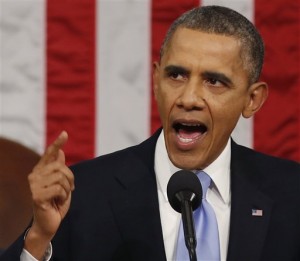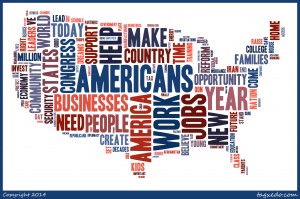President Barack Obama promised in his State of the Union address to use everything in his power to help get the American economy back on track. He asked for the American people’s help in accomplishing his goals.
“It is you, our citizens, who make the state of our Union strong,” the president said.
Obama stressed his commitment to using executive authority when necessary, saying, “America does not stand still, and neither will I.”
“Wherever and whenever I can take steps without legislation to expand opportunity for more American families, that’s what I’m going to do,” he said.

The president went on to announce an Executive Order to raise the minimum wage for federal contractors from $7.25 an hour to $10.10 an hour. He said the current federal minimum wage is worth twenty percent less than what it was when Ronald Reagan was president in the 1980s. Obama then urged America’s business leaders to do what they can to raise their employees’ wages.
The president also spoke about the many accomplishments of his energy policy, such as more American homes using solar energy, renewed investments in natural gas and the United States reducing its “total carbon pollution more than any other nation on Earth.”
He also reemphasized his commitment to a “cleaner energy policy.” Deriding critics of climate change, the president explained why he is so committed to making the United States even more environmentally conscious.
“The debate is settled. Climate change is a fact,” he said. “And when our children’s children look us in the eye and ask if we did all we could to leave them a safer, more stable world, with new sources of energy, I want us to be able to say, ‘Yes, we did.'”
Obama also responded to the criticisms about the shaky implementation of his health care law last October. He related the story of a woman who was the beneficiary of the controversial new law.
“A pre-existing condition used to mean that someone like Amanda Shelley, a physician assistant and single mom from Arizona, couldn’t get health insurance,” Obama said. “But on Jan. 1, she got covered. On Jan. 3, she felt a sharp pain. On Jan. 6, she had emergency surgery. Just one week earlier, Amanda said, that surgery would’ve meant bankruptcy.”
The president spoke about the goals he has for improving American education and remaining competitive globally. Outlining some of his hopes for the future, Obama assured Americans that implementation of a better system will not be easy.
“Some of this change is hard,” Obama said. “It requires everything from more challenging curriculum and more demanding parents to better support for teachers and new ways to measure how well our kids think, not how well they can fill in a bubble on a test.”
“The bottom line is, Michelle and I want every child to have the same chance this country gave us,” Obama said.

Obama stressed the work he is doing to improve America’s influence abroad, his commitment to negotiating with world powers to halt the progress of Iran’s nuclear program. The president invoked the names of popular past presidents from both political parties in order to gain support for his negotiation strategy.
“If John F. Kennedy and Ronald Reagan could negotiate with the Soviet Union, then surely a strong and confident America can negotiate with less powerful adversaries today,” he said.
“These negotiations will be difficult. They may not succeed,” the president added. “But these negotiations do not rely on trust; any long-term deal we agree to must be based on verifiable action that convinces us and the international community that Iran is not building a nuclear bomb.”
One of the most emotional moments of the night was when Obama told the story of Sergeant First Class Cory Remsburg, who was nearly killed by a roadside bomb in Afghanistan in October 2009.
“For months, he lay in a coma. The next time I met him in the hospital, he couldn’t speak; he could barely move,” Obama said. “Over the years, he’s endured dozens of surgeries and procedures, and hours of grueling rehab every day.”
“My fellow Americans, men and women like Cory remind us that America has never come easy,” Obama continued. “Our freedom, our democracy, has never been easy.”
The relating of this story resulted in one of the biggest of many standing ovations from the crowd. Remsburg, the invited guest of First Lady Michelle Obama, was visibly emotional as the crowds cheered him and his service.
A transcript of the President’s remarks can be read here.




